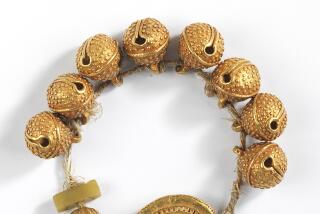Antiquities imperiled amid Egypt protest
- Share via
Reporting from Cairo — Egyptians are hoping against hope that forging a new future won’t cost them their past.
Tumultuous protests sweeping across the country carry the hope of a new government, a thrilling prospect for a beleaguered citizenry. But as looters move to take advantage of the unrest, archaeological experts warn that Egypt’s treasure trove of antiquities is in peril.
The center of the protest movement, Tahrir Square, abuts the Egyptian Museum, home to thousands of priceless artifacts encompassing centuries of Pharaonic history. For days, the ochre-colored neoclassical building in the heart of Cairo has been closely guarded by troops, tanks and a human chain of civilian volunteers, but not before it was broken into last week by looters.
The raiders did little serious damage, antiquities officials said, though chaos in the surrounding streets has prevented a thorough reckoning. At least two mummies were damaged, along with a number of smaller objects, and some display cases were smashed, said museum director Tarek Awady. Thieves were said to have penetrated the gated gallery containing the prized King Tutankhamen collection, one of the museum’s main attractions, but apparently broke only a single statue.
That breach, on Friday night, galvanized a contingent of impassioned defenders who have pledged to keep plunderers at bay. Some have been outside the museum since word of the first attack, determined to protect the country’s cultural patrimony.
“It’s the heart of our civilization,” said 32-year-old Ali Said, perspiring in the noonday heat as he stood guard outside the museum Tuesday, arms linked with those of men standing beside him. “And it’s not just for us; it belongs to the entire world.”
Dozens of would-be museum raiders have been taken into custody, military officials say. But the volunteers have tightened their cordon, keeping watch through the night as protesters throng the adjoining square.
“We’ll defend this place with our bodies,” pledged Bahaa Yusef, a 25-year-old lawyer.
Such protection, though, is not being afforded to many of the country’s remote open-air sites, said Gadallah Ali Gadallah, the former head of antiquities at the Ministry of Culture.
The phenomenon of grave robbers and looters is nearly as old as the objects they covet, he said. “They are always on the lookout for any opportunity, any lapse in security.”
Although the country’s two dozen antiquities museums and the three major pyramids on the outskirts of Cairo have been secured by the army, many objects are housed in vulnerable warehouses. Thieves reportedly tried to break into a warehouse near the Karnak Temple outside Luxor, and struck another at the Qantara Museum near the Suez Canal. Saqqara, an important site south of Cairo with a trove of ancient tombs near the country’s first pyramid, also was reportedly hit.
It is an irony lost on few that a protest movement that has brought about such a sense of national empowerment also indirectly threatens a heritage that is a source of enormous pride even to the humble and illiterate among the populace.
“These things, if they are lost, they can never be recovered,” said Mohammed Said, another volunteer defender on the edge of the Cairo square. “They are what it means to be an Egyptian.”
More to Read
Sign up for Essential California
The most important California stories and recommendations in your inbox every morning.
You may occasionally receive promotional content from the Los Angeles Times.










